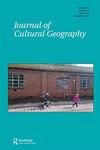Mapping-Ofrenda: mapping as mourning in the context of migration
IF 0.9
Q3 GEOGRAPHY
引用次数: 0
Abstract
ABSTRACT This paper proposes the concept of mapping-ofrenda, which envisions mapping as a form of mourning and remembering while living in the context of migration. Inspired by the traditional Mexican ofrenda, the mapping-ofrenda aims to collect, curate, and represent posthumous memories. It can be produced collaboratively or individually, built with physical or digital maps, shared with other people, or kept private, and be dedicated to a single deceased or to an entire community. Through the process of co-designing two online ofrenda-maps with two Latina-American women living in Montreal (Canada) we identified some of the potential of mapping-ofrenda, including its capacity to stimulate our memories and remember stories on the verge of disappearing, to ground them to places, and to share them with people that might live far away. Mapping-ofrenda can also be a way of making visible the global geography of migration through highly intimate memories and acknowledging both the very personal and the highly universal need to remember and grieve. Finally, the main value of mapping-ofrenda in the context of migration, may be its capacity to reactivate and strengthen existing links and connections between people that are still alive but that may live far away.映射Ofrenda:在移民背景下映射为哀悼
摘要:本文提出了映射-记忆的概念,将映射想象成一种生活在移民背景下的哀悼和记忆形式。受墨西哥传统文化的启发,地图文化旨在收集、整理和呈现死后的记忆。它可以合作制作,也可以单独制作,可以用物理地图或数字地图制作,可以与他人共享,也可以保密,可以献给一位死者,也可以献给整个社区。通过与两名居住在加拿大蒙特利尔的拉丁美洲妇女共同设计两张在线地图的过程,我们发现了地图地图的一些潜力,包括它能够激发我们的记忆,记住即将消失的故事,将它们与地方联系起来,并与可能生活在很远的人分享它们。“绘图”也可以是一种方式,通过高度亲密的记忆,使全球移民地理清晰可见,并承认非常个人和高度普遍的记忆和悲伤需求。最后,在移徙的背景下绘制地图的主要价值可能在于它能够重新激活和加强仍然活着但可能住在很远地方的人们之间的现有联系和联系。
本文章由计算机程序翻译,如有差异,请以英文原文为准。
求助全文
约1分钟内获得全文
求助全文
来源期刊

Journal of Cultural Geography
GEOGRAPHY-
CiteScore
1.70
自引率
22.20%
发文量
15
期刊介绍:
Since 1979 this lively journal has provided an international forum for scholarly research devoted to the spatial aspects of human groups, their activities, associated landscapes, and other cultural phenomena. The journal features high quality articles that are written in an accessible style. With a suite of full-length research articles, interpretive essays, special thematic issues devoted to major topics of interest, and book reviews, the Journal of Cultural Geography remains an indispensable resource both within and beyond the academic community. The journal"s audience includes the well-read general public and specialists from geography, ethnic studies, history, historic preservation.
 求助内容:
求助内容: 应助结果提醒方式:
应助结果提醒方式:


